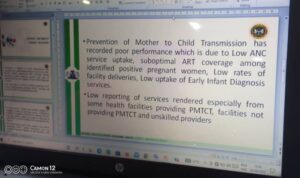Health
HIV/AIDS: We Prefer TBAs To Healthcare Providers -Pregnant Women

In the face of growing low coverage in pediatric HIV in Rivers State, some pregnant women have explained why they prefer Traditional Birth Attendants (TBAs).
The Tide’s investigation during a recent monitoring visit to recognised TBAs in the State by a tripartite breakthrough partnership project comprising UNICEF, Society for Family Health (SFH), and Elizabeth Pediatrics AIDS Foundation (EPAF), revealed that most HIV positive pregnant women opt to patronise the TBAs rather than the orthodox health care providers due to issues relating to stigma and ill-treatment.

One of such women, who spoke on condition of anonymity, said while the orthodox healthcare providers treat them with contempt, the TBAs treat them with love and care.
According to her, she opted for the “Apostolic Church Assembly Home” in Bodo, Gokhana Local Government Area because their attendants at the TBA home are more accommodative.
“When I visited the hospital to register for Ante-Natal Care (ANC), I was diagnosed of HIV. Immediately the nurses saw that the result was positive, their attitude towards me became negative.
“They started treating me as if I was a prostitute (sex worker). So, after my second visit, when I knew I was positive, I was treated disrespectfully, I decided to patronize a TBA. That’s how I came to this home”, she stated.
At the “Mama Comfort Umuwaria Home”, in Oyigbo LGA, another HIV positive pregnant woman simply said she prefers the home to the hospital because it is cheaper, and she gets the best of attention from the attendants.
“When the owner of this place referred me to the hospital for enrollment for Prevention of Mother-To-Child Transmission (PMTCT) of HIV/AIDS, I did as instructed.
“But after my first visit, I stopped going because of the bills I was asked to pay, nonchalance and degrading treatment from healthcare providers.
“Here, I’m charged #5,000, out of which I’ve only paid #1,500, but they treat me as a human being anytime I come, and allow me to pay the balance at my pace, but before I deliver”, she said.
At the “Confidence Maternity Favour Home” in ONELGA, Mrs. Faith Eke, who is not HIV positive, said she prefers the TBAs because they make her more comfortable in general terms.
This, she said, include cheaper charge, homeliness, attention, mutual relationship, with attendance an regular communication, even during irregular hours of the day outside the home, and as situation warrants.
Explaining the reason for the monitoring visits to TBAs to ascertain how they relate with pregnant women in terms of sensitization on HIV, Aisha Dadi of the SFH, stated that it is as a result of low viral load coverage for children in Rivers State.
Dadi, who also said Nigeria has a low PMTCT coverage, stated that Rivers State had about 18% low viral load coverage in 2021.
“So, we felt that we need to move focus in finding children who are HIV positive, and also pregnant women, who are HIV positive, so that we can prevent the unborn child from contracting HIV”, she said.
Explaining further, an expert in PMTCT with UNICEF, Dr. Abiola Davies, said the essence of monitoring visits to TBA homes in Rivers State is based on the revelation that a lot of pregnant women patronize TBAs more than health facilities, thus making it difficult to have accurate data on pediatric HIV and positive mothers.
“We know that one of the major challenges we have is that a lot of our women do not go to health facilities, and that they mainly patronize the TBAs.
“Why we need to reach out to the TBAs is that the women go there, and because they go there, they are not coming to the health facilities.
“So, we must go and find them. Every single woman is important, every single pregnancy is important for us to get to the point that no child in Nigeria is born with HIV”, she stated.
By: Sogbeba Dokubo
Health
‘How Micro RNA Research Won Nobel Prize’
Two United States scientists who unraveled the human micro RNA have won the Nobel Prize in Physiology or Medicine 2024.
Victor Ambros and Gary Ruvkun won the coveted prize for their work on microRNA as their discoveries help explain how complex life emerged on earth and how the human body is made up of a wide variety of different tissues.
MicroRNAs influence how genes – the instructions for life – are controlled inside organisms, including humans.
Every cell in the human body contains the same raw genetic information, locked in our DNA.
However, despite starting with the identical genetic information, the cells of the human body are wildly different in form and function.
The electrical impulses of nerve cells are distinct from the rhythmic beating of heart cells. The metabolic powerhouse that is a liver cell is distinct to a kidney cell, which filters urea out of the blood.
The light-sensing abilities of cells in the retina are different in skillset to white blood cells that produce antibodies to fight infection.
So much variety can arise from the same starting material because of gene expression.
The US scientists were the first to discover microRNAs and how they exerted control on how genes are expressed differently in different tissues.
The medicine and physiology prize winners are selected by the Nobel Assembly of Sweden’s Karolinska Institute.
They said: “Their groundbreaking discovery revealed a completely new principle of gene regulation that turned out to be essential for multicellular organisms, including humans.
“It is now known that the human genome codes for over 1,000 microRNAs.”
Health
WHO Begins Regulation On Antibiotic Waste
The World Health Organisation (WHO) has begun acting to curb effects of antibiotic pollution.
The new guidance on wastewater and solid waste management for antibiotic manufacturing sheds light on this important but neglected challenge ahead of the United Nations General Assembly (UNGA) High-Level Meeting on antimicrobial resistance (AMR) taking place on 26 September 2024.
The emergence and spread of AMR caused by antibiotic pollution could undermine the effectiveness of antibiotics globally, including the medicines produced at the manufacturing sites responsible for the pollution.
Despite high antibiotic pollution levels being widely documented, the issue is largely unregulated and quality assurance criteria typically do not address environmental emissions. In addition, once distributed, there is a lack of information provided to consumers on how to dispose of antibiotics when they are not used, for example, when they expire or when a course is finished but there is still antibiotic left over.
“Pharmaceutical waste from antibiotic manufacturing can facilitate the emergence of new drug-resistant bacteria, which can spread globally and threaten our health. Controlling pollution from antibiotic production contributes to keeping these life-saving medicines effective for everyone,” said Dr Yukiko Nakatani, WHO Assistant Director-General for AMR ad interim.
Globally, there is a lack of accessible information on the environmental damage caused by manufacturing of medicines.
“The guidance provides an independent and impartial scientific basis for regulators, procurers, inspectors, and industry themselves to include robust antibiotic pollution control in their standards,” said Dr Maria Neira, Director, Department of Environment, Climate Change and Health, WHO. “Critically, the strong focus on transparency will equip buyers, investors and the general public to make decisions that account for manufacturers’ efforts to control antibiotic pollution.”
Health
Kebbi Harmonises Doctors’ Salaries To Curb Brain Drain
In a concerted effort to curb brain drain, the Kebbi State Government has harmonised medical doctors’ salaries to be at par with their colleagues in the federal government’s tertiary health facilities.
Kebbi State Commissioner for Health, Musa Inusa-Isma’il, disclosed this at the handing over of ambulances to the state-owned health facilities at the Ministry of Health in Birnin Kebbi yesterday.
Inusa Isma’il, according to a statement by Ahmed Idris, the Chief Press Secretary to the governor, said the essence of the harmonisation was to retain the existing medical doctors and attract more to the services of the state.
According to him, the doctors across the state had already started enjoying the new salaries from August 2024.
He said the release of the vehicles was in fulfilment of Governor Nasir Idris’ promise to uplift health care services in the state.
“His Excellency said I should inform you, the beneficiaries of this gesture, that the vehicle should be strictly used for the intended purpose. It should not be used for anything else.
“If there is no referral case, each of the vehicles must be parked at the hospital by 6 pm. The governor said you should warn your drivers against reckless driving as well as violating the instructions.
“We should also do everything possible to reciprocate the gesture by working according to the terms and conditions attached,” he advised.
The benefiting health facilities included Sir Yahaya Memorial Hospital, Birnin Kebbi; State Teaching Hospital, Kalgo; General Hospital, Argungu; General Hospital, Yauri; General Hospital, Zuru; and General Hospital, Bunza.
In his speech, the permanent secretary of the ministry, Dr Shehu Koko, recalled that the ambulances were handed over to the ministry last Friday by the governor for the onward handover to the benefiting hospitals.
He observed that the ambulances would go a long way in improving the referral system in the state, adding that delays in reaching the secondary and tertiary facilities would be eliminated.
The permanent secretary attributed the high rate of maternal mortality in the country to delays in getting to the health facilities for proper medical care.
“We believe with the provision of these ambulances, part of the gaps we have in our referral system will be addressed, whereby patients who require secondary healthcare could be easily transported to secondary and tertiary health centres, where they can get such help,” he said.
In a goodwill message, Commissioner for Information and Culture Alhaji Yakubu Ahmed expressed gratitude to the governor for the support he has given to the ministry to excel.
While advising the beneficiaries to use the vehicles judiciously, the commissioner advised that services and maintenance of the vehicles must be prompt to derive the maximum benefits from the vehicles.
The commissioner also highlighted some achievements recorded by the government in the last year, including beautification of the state capital, completion of a multimillion-naira ultramodern state secretariat, road construction, construction and renovation of classrooms and upgrading of some health facilities, among others.
-
Politics5 days ago
Lagos LG Polls: Police Restrict Movement, Tightens Security
-

 Politics5 days ago
Politics5 days agoReps Constitution Review Committee Holds Zonal Hearing For Rivers, C’River, Akwa Ibom In Calabar
-
Opinion5 days ago
Checking Herdsmen Rampage
-

 News5 days ago
News5 days agoI’m Committed To Community Dev – Ajinwo
-
News5 days ago
Tinubu, Govs Forum Congratulate Okpebholo On S’Court Victory …As Obaseki Expresses Disappointment
-
Rivers5 days ago
NDDC: Staff Walk Ten Kilometers To Commemorate 25th Anniversary
-

 News5 days ago
News5 days agoSenate Replaces Natasha As Committee Chairman
-
Politics5 days ago
Obey Order On AA In Six Days, Court Directs INEC, Yakubu

